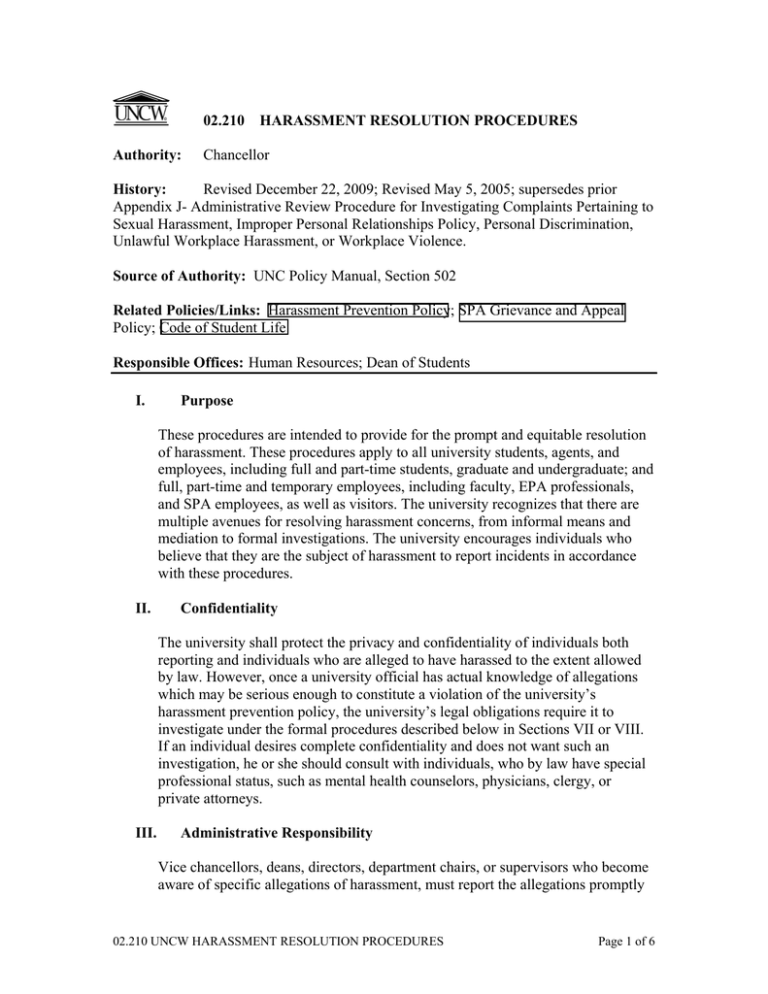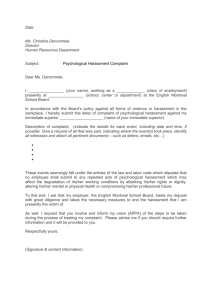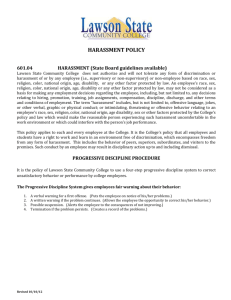
02.210 HARASSMENT RESOLUTION PROCEDURES
Authority:
Chancellor
History:
Revised December 22, 2009; Revised May 5, 2005; supersedes prior
Appendix J- Administrative Review Procedure for Investigating Complaints Pertaining to
Sexual Harassment, Improper Personal Relationships Policy, Personal Discrimination,
Unlawful Workplace Harassment, or Workplace Violence.
Source of Authority: UNC Policy Manual, Section 502
Related Policies/Links: Harassment Prevention Policy; SPA Grievance and Appeal
Policy; Code of Student Life
Responsible Offices: Human Resources; Dean of Students
I.
Purpose
These procedures are intended to provide for the prompt and equitable resolution
of harassment. These procedures apply to all university students, agents, and
employees, including full and part-time students, graduate and undergraduate; and
full, part-time and temporary employees, including faculty, EPA professionals,
and SPA employees, as well as visitors. The university recognizes that there are
multiple avenues for resolving harassment concerns, from informal means and
mediation to formal investigations. The university encourages individuals who
believe that they are the subject of harassment to report incidents in accordance
with these procedures.
II.
Confidentiality
The university shall protect the privacy and confidentiality of individuals both
reporting and individuals who are alleged to have harassed to the extent allowed
by law. However, once a university official has actual knowledge of allegations
which may be serious enough to constitute a violation of the university’s
harassment prevention policy, the university’s legal obligations require it to
investigate under the formal procedures described below in Sections VII or VIII.
If an individual desires complete confidentiality and does not want such an
investigation, he or she should consult with individuals, who by law have special
professional status, such as mental health counselors, physicians, clergy, or
private attorneys.
III.
Administrative Responsibility
Vice chancellors, deans, directors, department chairs, or supervisors who become
aware of specific allegations of harassment, must report the allegations promptly
02.210 UNCW HARASSMENT RESOLUTION PROCEDURES
Page 1 of 6
either to the Human Resources Director/Equal Employment
Opportunity/Affirmative Action Officer (“EEO/AA officer”) or the Dean of
Students, as appropriate based on the status of the alleged offender.
IV.
Retaliation Prohibited
Any act by a university employee, agent, or student of reprisal, interference,
restraint, discrimination, coercion or harassment against any person using these
procedures shall constitute a policy violation and shall be subject to prompt and
appropriate disciplinary action.
V.
Other Remedies
A. The existence of these procedures does not prohibit individuals from also
filing claims under Title VII (Civil Rights Act of 1964) with the Equal
Employment Opportunity Commission or under Title IX (Education
Amendments of 1972) with the Office of Civil Rights, U.S. Department of
Education.
B. SPA employees may file a grievance under the Unlawful Workplace
Harassment section of the SPA Grievance and Appeal Policy. This is the
required procedure for SPA employees who desire to maintain their appeal
rights through the Office of Administrative Hearings of the State
Personnel Commission. To use this procedure, the SPA employee must
submit a written grievance to Human Resources within thirty (30) calendar
days of the alleged harassment. SPA employees who do not submit a
written grievance to Human Resources within this time frame may still
utilize the formal resolution procedures for resolving their concerns as
stated below but will not have the option of later appealing to the Office of
Administrative Hearings or using any other university appeal procedures.
VI.
Informal Resolution
A. In deciding whether to pursue informal means, including mediation, the
affected individual is encouraged to seek the assistance of the Title IX
Coordinator, the ADA Coordinator or representatives in the Office of the
Dean of Students, Housing and Residence Life staff, Student Health
Services, the Counseling Center or Human Resources. These offices are
available to assist the affected individual in crafting the message to send to
the offending individual, as well as recommending other informal
mechanisms and setting up mediation. Whichever office the affected
individual elects to discuss his/her concerns with, the issue of
confidentiality should be addressed before specific facts or identities are
disclosed due to the university’s legal obligations to investigate all
allegations that may constitute harassment as defined in the university’s
harassment prevention policy.
02.210 UNCW HARASSMENT RESOLUTION PROCEDURES
Page 2 of 6
B. Harassment concerns may be resolved through a variety of informal
mechanisms, including but not limited to the following:
1. Telling the alleged offender his or her behavior is unwelcome
and must stop.
2. Asking for an apology and a commitment that the behavior will
stop.
3. Sending a copy of the university’s harassment prevention policy
to the alleged offender.
4. Writing to the alleged offender regarding the conduct, pointing
out the effects of such behavior, and explaining the behavior
change desired.
5. Having the pertinent supervisor to counsel the alleged offender
about appropriate behaviors and conduct expectations.
6. Seeking to mediate the concern.
VII.
Formal Resolution: Student Initiated Harassment
Complaints about students must be presented to the Office of the Dean of
Students. The Dean of Students, or designee, shall investigate and take
appropriate disciplinary action commensurate with the severity and/or frequency
of the conduct. Discipline resulting from student harassment shall be taken in
accordance with the procedures provided in The Code of Student Life.
VIII. Formal Resolution: Employee or Other Non-Student Initiated
Harassment
A. A complaint must be presented within ninety (90) calendar days of the
alleged harassing incident to the EEO/AA officer. If filed later than ninety
calendar (90) days, the EEO/AA officer may extend the time limit based
on extenuating circumstances and at his/her sole discretion. If the
allegations are against the EEO/AA officer, the complainant may present
the complaint to the general counsel for investigation and resolution.
B. Complainants are not required to provide a signed, written statement
describing their complaint; though such documentation is strongly
encouraged. If the complainant conveys the allegations verbally, the
EEO/AA officer, or designee, shall document the complaint and have the
02.210 UNCW HARASSMENT RESOLUTION PROCEDURES
Page 3 of 6
complainant review and sign the documentation to indicate that it is
accurate and complete.
C. Depending on the nature and severity of the allegations, the university
may be obligated to investigate a complaint of harassment without a
signed, written statement once the university has actual notice of possible
harassment. Under Title IX, the university is legally obligated to take
prompt and remedial measures to end harassment of a student, even if the
student does not make a complaint or otherwise requests action to be
taken.
D. The EEO/AA officer, or designee, shall determine whether the allegations
fall within the scope of the university’s harassment prevention policy. If
the determination is that the policy is implicated, the EEO/AA officer, or
designee(s), shall investigate promptly.
E. At a minimum, the EEO/AA officer or designee shall form a fact finding
team of two impartial and unbiased individuals who shall provide for an
interview of the complainant and the respondent. Witnesses should also be
interviewed, and any relevant documentary evidence shall be reviewed.
The fact finding team shall take notes of all individuals who are
interviewed. The fact finding team shall instruct individuals that retaliation
is prohibited and is a violation of university policy and the law. The
individuals shall also be instructed about the confidentiality and privacy
parameters of the investigation.
F. Both the complainant and the respondent may be accompanied when
interviewed by another member of the university community, so long as
the individual does not interfere with the interview. This person’s role is
simply as an observer. Representation by legal counsel during the
interview is prohibited.
G. Upon completion of the investigation, the fact finding team shall prepare
a written report of the factual findings . The EEO/AA officer shall forward
the report to the pertinent senior officer in the unit where the respondent is
employed. The senior officer shall make a determination of whether a
policy violation has occurred.
H. In the event that a violation of the university’s harassment prevention
policy is found, the pertinent senior officer shall determine the appropriate
disciplinary action, in consultation with the EEO/AA officer (and the Title
IX Coordinator if a sexual harassment matter), and in accordance with the
appropriate disciplinary procedures pertaining to the affected individual
(e.g. Section 603 of the Code of the Board of Governors for imposition of
serious sanctions against a faculty member; SPA Grievance Procedure; or
EPA Grievance Procedure). Any prior violations of the harassment
02.210 UNCW HARASSMENT RESOLUTION PROCEDURES
Page 4 of 6
prevention policy involving the respondent shall be considered in any
disciplinary action.
I. The complainant and the respondent shall be informed immediately when
the investigation is completed. Results of the investigation, the fact finding
report, and any subsequent disciplinary action shall be kept confidential to
the extent allowed by the Family Educational Rights and Privacy Act
(“FERPA”) and the North Carolina Personnel Records Act.
IX.
Record Keeping
A. The Human Resources Office shall retain all records of the investigation
in a confidential file.
B. The EEO/AA officer and the Dean of Students shall provide statistics on
an annual basis to the chancellor and the Title IX Coordinator of the
number of incidents that have been investigated under the formal
resolution procedures.
X.
Appeal Procedures
A. The grounds for appeal by the complainant or the respondent may be for
only these reasons:
1. The harassment is ongoing;
2. The remedy was not implemented;
3. Material procedural irregularities occurred during the
investigation; or
4. New evidence has been discovered that had not been available
during the investigation
B. Dissatisfaction with the university’s conclusion from the formal resolution
procedures is not grounds for an appeal. Appeals of any disciplinary action
must be taken in accordance with the SPA grievance procedures, the EPA
grievance procedures, or Section 603 of the Code of the Board of
Governors, as appropriate.
C. A written appeal statement must be filed within thirty (30) calendar days
after notice that the investigation has been completed. The statement must
be sent to the EEO/AA officer or to the general counsel if the appeal is
against the EEO/AA officer.
D. Appeal statements must include a copy of the original complaint, a
summary of efforts to resolve the harassment, and the grounds for the
appeal.
02.210 UNCW HARASSMENT RESOLUTION PROCEDURES
Page 5 of 6
E. The pertinent Vice Chancellor, or designee, shall review the appeal with
the EEO/AA officer, general counsel (and the Title IX Coordinator if a
sexual harassment matter) and make a decision. The decision must be in
writing and sent to the complainant in a matter which ensures receipt. This
decision constitutes a final university decision.
02.210 UNCW HARASSMENT RESOLUTION PROCEDURES
Page 6 of 6



